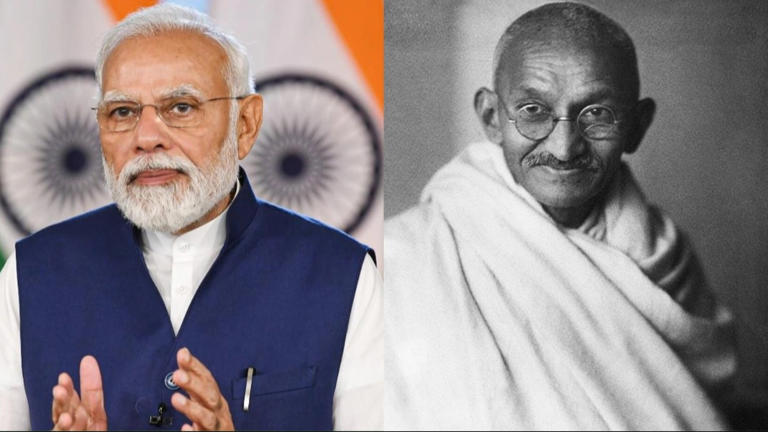Vice-President compares PM Modi to Mahatma Gandhi, Congress says ‘shameful’

Vice-President compares PM Modi to Mahatma Gandhi, Congress says ‘shameful’
Vice-President Jagdeep Dhankhar, at an event dedicated to Jain mystic and philosopher Shrimad Rajchandraji, drew parallels between Mahatma Gandhi and Prime Minister Narendra Modi, assigning the title of “‘mahapurush” (great man) of the last century to Gandhi and labeling Modi as “yugpurush” (man of the century).
In his address, Dhankhar stated, “I would like to tell you one thing, The mahapurush of the last century was Mahatma Gandhi. Narendra Modi is the yugpurush of this century.” This comparison aligns with the recognition of Mahatma Gandhi as a pivotal figure in India’s struggle for independence and the acknowledgment of Prime Minister Modi’s influence and leadership in the contemporary era.
While drawing parallels between historical figures and present leaders is a common rhetorical device, it can evoke varied reactions depending on individual perspectives and opinions. Such comparisons often reflect the speaker’s admiration for the qualities and impact of the individuals being referenced, and they are sometimes used to underscore the significance of contemporary leaders in shaping the course of history.
Vice-President Jagdeep Dhankhar’s statement, comparing Mahatma Gandhi and Prime Minister Narendra Modi, has generated contrasting reactions. Dhankhar emphasized that while Mahatma Gandhi liberated India from British rule using truth and non-violence, Prime Minister Modi has set the country on a path of progress. He highlighted the alignment of their actions with the teachings of Shrimad Rajchandraji.
However, the comparison has faced criticism from Congress leader Manickam Tagore, who deemed it “shameful” to equate Prime Minister Modi with Mahatma Gandhi. Such comparisons often stir debates and varied opinions, especially when it involves figures with significant historical impact.
Criticism and disagreement over the likening of leaders from different eras are not uncommon in political discourse. Individuals may interpret historical events and leadership differently, influenced by their perspectives and affiliations. Dhankhar’s comments reflect his positive assessment of both Mahatma Gandhi and Prime Minister Modi, aligning their actions with the teachings of Shrimad Rajchandraji. Still, it’s evident that not everyone shares the same viewpoint, highlighting the subjective nature of historical comparisons in political discourse.
The critical response from Manickam Tagore and the reaction from Bahujan Samaj Party MP Danish Ali underscore the divisive nature of political rhetoric and the impact it can have on public discourse.
Manickam Tagore’s comment on the comparison between Mahatma Gandhi and Prime Minister Modi reflects his disagreement with Vice-President Jagdeep Dhankhar’s characterization. Tagore uses strong language, describing it as “shameful” and suggesting that there is a limit to sycophancy that has been crossed.
Danish Ali’s response, on the other hand, seems to address a broader concern about the tone of political discourse in Parliament. His mention of “abusive language against a particular community” suggests that he perceives a potential negative impact on communal relations stemming from political rhetoric.
The exchange highlights the sensitivities surrounding political language and the need for leaders to choose their words carefully, considering the potential repercussions on public sentiment and social harmony. Disagreements in political discourse are inevitable, but the tone and language used can significantly influence the public perception of leaders and political parties.
The context provided clarifies the reaction from Bahujan Samaj Party (BSP) MP Danish Ali regarding the remarks made by Vice-President Jagdeep Dhankhar. The criticism from Danish Ali seems to be directed at the use of objectionable language by BJP MP Ramesh Bidhuri during a discussion on the Chandrayaan-3 mission in the Lok Sabha in September. Ali’s concern about abusive language against a particular community likely stems from his objection to the nature of the remarks made by Bidhuri.
The mention of unity against forces resisting India’s progress, along with an emphasis on the nation’s ancient civilization, suggests that Vice-President Dhankhar was addressing broader themes related to national identity and unity. Such discussions often involve a mix of historical references and contemporary concerns, with an aim to foster a sense of unity and pride among the audience.
Political events and discussions, especially those involving sensitive topics, can evoke strong reactions and debates. The use of language and the framing of issues play a crucial role in shaping public perceptions, and leaders are often scrutinized for their choice of words in the public domain.





